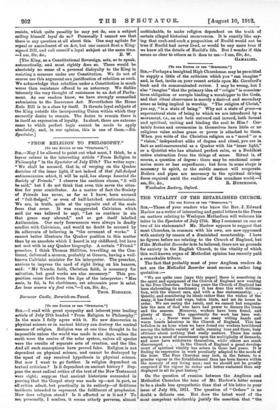[To TEE EDITOR OF THE "SPECTATOR. "] Sre,—Perhaps a benighted High
Churchman may be permitted to supply a little of the criticism which you "can imagine '' and, in fact, invite on your recent article upon Mr. Cornford's book and its communicated review. I may be wrong, but I also " imagine" that the primary idea of " religio " is conscien- tious obligation or scruple binding a worshipper to the Gods, and that ritual observance is merely a derived and secondary sense as being implied in worship. "The religion of Christ," you say, "is a state of being." Why not a state of grace—a supernatural state of being to which we are introduced by s. sacrament, i.e., an act both outward and inward, both formal and spiritual, uniting and binding the soul to Him ? Cer- tainly forms and ceremonies in themselves have little or no religious value unless grace or power is attached to them. When you write of the Christian religion as a "mood" or a " vision," independent alike of dogma and ritual, you are in fact as anti-sacramental as a Quaker with his "inner light," or a Quietist who has attained perfect calm, or a Buddhist entire abstraction from the things of sense. Ritual is, of course, a question of degree : there may be emotional acces- sories more or less superfluous; but form in some shape is necessary to spirit, or the subtle essence will evaporate. Boilers and pipes are necessary to the spiritual driving force required amid the realities of this mundane world.—I am, Sir, &c., R. HUTCHISON. Woodeatcm. Rectory, Oxford.


































 Previous page
Previous page